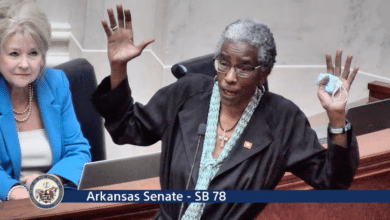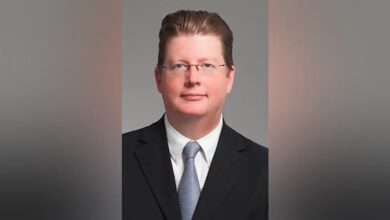By Robert Steinbuch
Yesterday, Senator Bart Hester said: (1) that folks were “messing” with legislators by communicating with their elected officials on the dismal-proposed Freedom of Information Act revisions, (2) that he (Hester) graciously wasn’t going to name the names of those “messing” with legislators, and (2) that he (Hester) could’ve passed the original lousy bill yesterday morning.
Let me clear up some confusion:
- The name you’re looking for is S-T-E-I-N-B-U-C-H. Feel free to tell everyone that I’m messing with legislators by giving them the legal advice that nobody else is providing.
- What you’re calling “messing” with legislators, the rest of us call democracy. (When you twist arms, by the way, is that “messing”?)
- And had you the votes to cram that awful bill down the throats of Arkansans yesterday morning and thought it smart to do that, you would’ve done so. Don’t seek congratulations for not being stupid. We don’t give out trophies for that—not yet, at least.
Now to the FOIA bill.
First, the latest version pared down the deliberative-process privilege exemption. Somebody’s listening. It still has problems, but it’s an improvement.
But the terrible sections on (1) exempting communications with attorneys for the state and (2) eliminating recovery of attorney’s fees for citizens who successfully sue any level of government (state, county, or local) are still in there.
Sadly, the revisions to the attorney-communications sections is a trick. For some unexplained reason, the bill has two sections on attorney-client communications, but the drafters of the new bill only changed one—and not well.
They added a bunch of language to Section 4 Paragraph (30) requiring government to demonstrate a credible threat of litigation before the exemption for attorney records applies, but the following part—Section 4 (31)—which says all “502(b)” material is exempt—remains unchanged.
Has anyone read 502(b) of the Rules of Evidence? 502(b) material covers attorney-client communications. This is the problem when there aren’t any attorneys in the room working for the legislators. The Bureau of Legislative Affairs is prohibited from giving legal advice. This is the result.
So, the effect of the amendments is that the proposed exemption for attorney communications is unchanged.
Indeed, the level of misinformation on this section is staggering. The Governor’s spokeswoman tweeted that I (yes, me!) am wrong about the law because—according to her—the attorney-client exemption doesn’t apply to criminal behavior.
Uh, yes it does.
This is the problem when you don’t have adults in the room. The attorney-client exemption squarely applies to criminal behavior more than anything else, in fact.
Moreover, both the new and old versions of the FOIA bill do nothing to protect Arkansans against Sandusky-molestation horrors like those that remained hidden in Pennsylvania.
Here’s how it would happen: A coach at an Arkansas state school rapes children. The school administration gets wind of it and immediately and correctly contacts counsel. Every record created thereafter—including that initial contact with counsel—is exempt under Rule 502(b).
Hey Legislature—how about protecting our children too!
This problem is real. Recall my exposé of Central Arkansas Library System. I was only able to make those revelations because I obtained records pursuant to the FOIA. Those damning records were clearly attorney-client communications—and a credible threat of litigation existed, because the library was initiating the litigation! If the same wrongdoing happens at the state level after this bill passes, we’ll get zilch. Unless you think that all wrongdoing only occurs at the local level, this exemption is really bad for Arkansas.
The state needs to continue to forgo a little “efficiency” so we can prevent or expose wrongdoing. An unchecked government is inherently dangerous.
Finally, the attorney’s fees section is unchanged. No longer does loser pay when the government loses a FOIA lawsuit—as is currently the law. Now the public are the losers!
Many sponsors of this FOIA bill also support “tort reform” requiring losers to pay the winners’ attorney’s fees. So, these legislators want you to pay the other side’s attorney’s fees if you lose a malpractice lawsuit against a hospital, but they don’t want the government to pay you if the government loses a FOIA lawsuit you brought. How’s that fair? It’s not.
Finally, while other key provisions in the bill are restricted to actions regarding state government, the attorney’s fee provision somehow also applies to county and local governments. So, when I sued the Pulaski County Sheriff on behalf of my conservative client for records showing among other things the cozy relationship between that sheriff and an operator of a gambling den, this provision would prevent me from collecting fees upon successfully getting the records. Is that who the Republican Senate is seeking to protect? Since when did the Legislature start shilling for leftist local government?
Robert Steinbuch is the author of the treatise on the Arkansas FOIA and is on the legislatively created Arkansas FOIA Taskforce. His views don’t necessarily reflect those of his employer.
ICYMI:
FOIA Expert: HB1003 is not about the security of our governor
Are the Legislators for the People or for the Governor?
Co-Founder of Gov’t Transparency Group: Gov’t designed to protect our rights, not deny our rights
FOIA Expert: Changes to FOIA Law Shouldn’t Happen During Special Session
Is Work Group a Threat to FOIA?
Conduit News depends on readers like you. Support our cause. Donate today.






